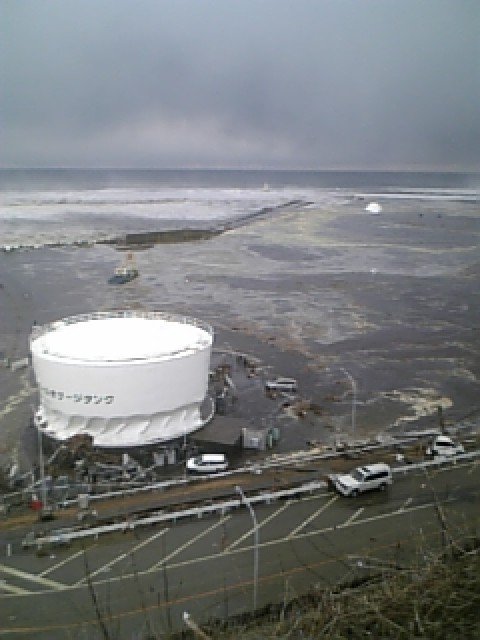Japan: Damaged reactors at nuclear plant could take 30 years to retire
Pictures of the Tsunami as it hits the Fukushima Daiichi Nuclear Power Station. This shows the slope at the eastern side of Radioactive Solid Waste Storage Facility.
November 1, 2011
The decommissioning of four reactors at the crippled Fukushima Daiichi nuclear power plant will likely take more than 30 years to complete, according to a report by Japanese officials.
The draft report, released by Japan’s Atomic Energy Commission of the Cabinet Office on Friday, said the removal of debris — or nuclear fuel — should begin by the end of 2021.
“We set a goal to start taking out the debris within a 10-year period, and it is estimated that it would take 30 years or more [after the cold shutdown] to finish decommissioning because the process at Fukushima would be complicated,” the report states.
Last month, the plant’s owner — Tokyo Electric Power Company — said engineers might be able to complete the cold shutdown of damaged reactors by the end of the year.
Temperatures in the three reactors where meltdowns occurred in the wake of the historic March 11 earthquake and tsunami have already been brought down below 100 degrees Celsius (212 degrees Fahrenheit), but the company has to maintain those conditions for some time before declaring the reactors in cold shutdown, Tokyo Electric spokesman Yoshikazu Nagai said.
Experts have said it will take years – perhaps decades – to fully clean up the worst nuclear disaster since Chernobyl. Hydrogen explosions blew apart the No. 1 and No. 3 reactor housings, while another hydrogen blast is suspected to have damaged the No. 2 reactor. Fires believed caused by heat from the No. 4 spent fuel pool damaged that unit’s reactor building.
The atomic energy commission’s report noted it took 10 years to remove nuclear fuel after the 1979 Three Mile Island disaster in the United States. The commission predicted removing fuel at Fukushima would require more time because the situation is more severe.
CNN’s Matt Smith contributed to this report.







